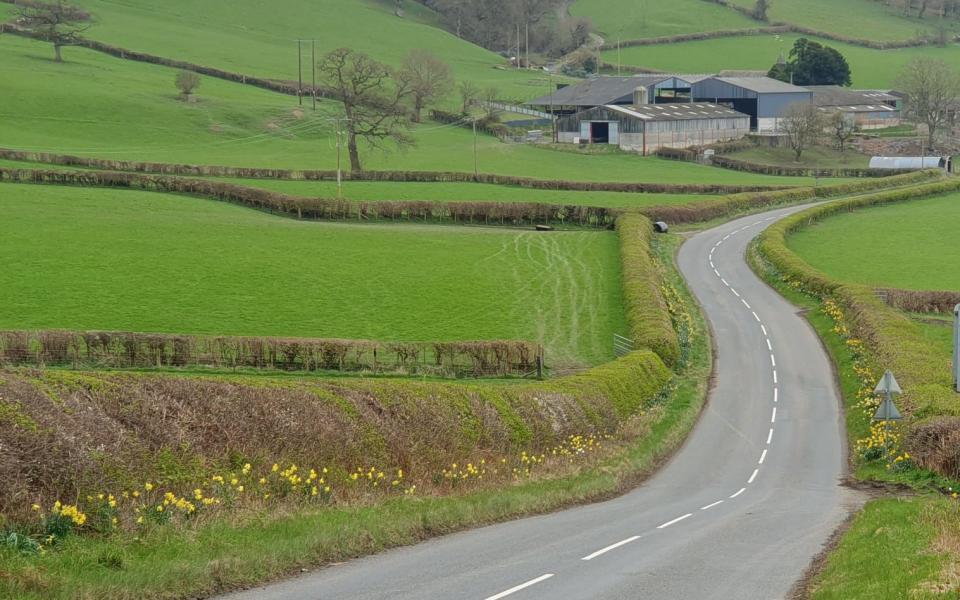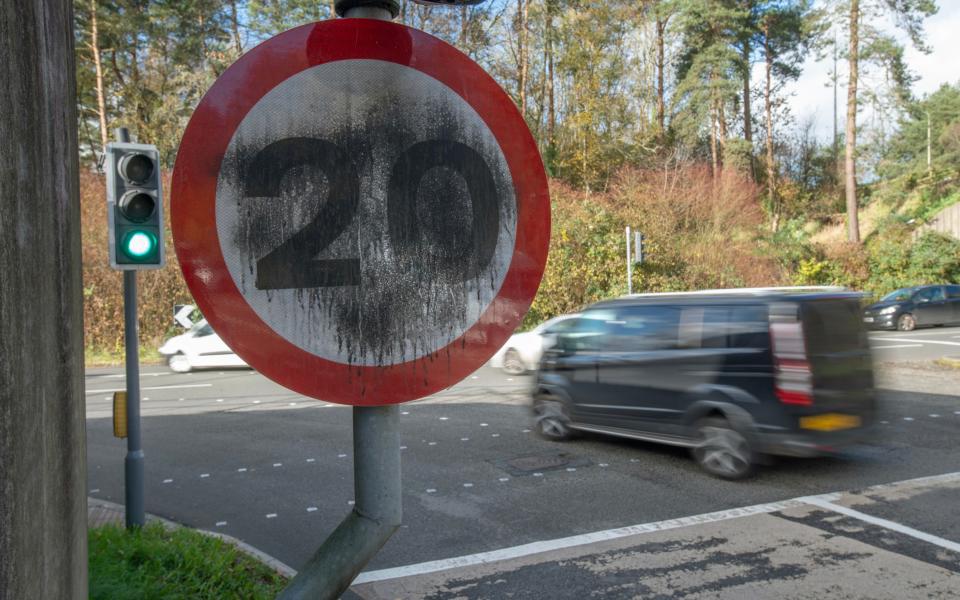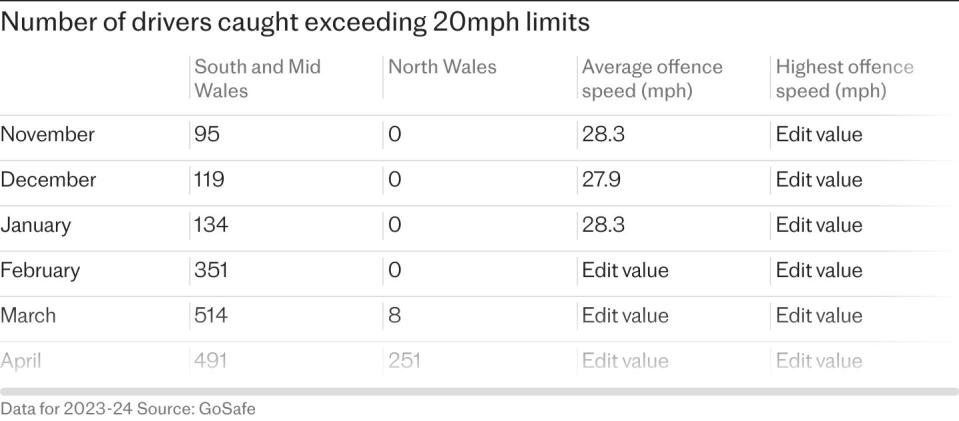Welcome to Wales: never mind the scenery, beware the 20mph limits

Rural Wales has long been praised for its largely empty, well-surfaced roads, with fine landscapes to boot; for drivers, the perfect antidote to crowded city centres with their congestion charges, Ultra Low Emissions Zones (Ulez) and Low Traffic Neighbourhoods (LTNs). While this region has struggled to rebuild its tourist trade following negative messaging during the Covid-19 pandemic and then last year’s indifferent weather, a new deterrent is in place as the Labour-led Welsh Government (WG) seeks to reduce driving speeds, seemingly at any cost.
The WG’s most controversial initiative has been the default 20mph limit, which came into force on Sept 17 in 2023 and applies “where people live” throughout Wales. This has increased the proportion of roads with a 20mph limit from 2 per cent to 37 per cent, covering a total of 802 miles. The change provoked an unprecedented 469,571 signatures for an online petition to the Welsh Parliament (Senedd), calling on the WG to “rescind and remove the disastrous 20mph law”.

The petition further stated that “the Welsh Government has failed to produce any convincing evidence to support these claims of safety. This law is being spearheaded by the WG Climate Change department.” By contrast, a counter-petition urging the WG to keep its “excellent new 20mph law” was supported by 5,399 signatories.
The link to climate change is an interesting one, since the default limit was introduced under the aegis of Lee Waters, the deputy minister for climate change. He was formerly a director of the charity Sustrans and had championed the Active Travel Act of 2013, designed to “make walking and cycling the most natural and normal way of getting about”.
In his Senedd role in 2023, Waters linked the new default limit directly to the aims of the Act by saying “if we don’t achieve those things then clearly the [20mph] policy will not have succeeded.” Yet, the Senedd’s own research shows the Act has yet to have a significant impact on active travel rates, while there’s been no significant change to air quality as a result of the 20mph policy.

In terms of safety, Waters claimed during a Senedd debate on Sept 12 in 2023 that “a 20mph default limit will pay for itself three times over from savings to the health service in the first year alone”. While it’s too early to discern reliable accident trend data from Wales post-20mph, a WG media release timed to coincide with its implementation did make impressive claims for a Spain-inspired urban 30kph (19mph) scheme, but without mentioning that its improved accident rates were mirrored in all EU countries when comparing 2019 data with 2021 across the pandemic years.
More reliably, a 2018 UK government report (by Atkins/AECOM/UCL) found “insufficient evidence” that 20mph limits in residential areas made a “significant change” to either collisions or accidents, while a review in November 2022 of Belfast’s 2016 move to 20mph noted “little effect for reduction in road traffic collisions, casualties and speed”.
Rather than improving road layouts, Mr Waters’ preferred solution was “if there is an accident blackspot, rather than saying ‘let’s spend £30 million over five years on a carbon intensive road scheme,’ let’s just drop the speed limit. We can do that next week, it won’t cost us anything. It will save lives.” Department for Transport guidelines state that speed limits should be “evidence-led and self-explaining”, so that they are “seen by drivers as the maximum speed rather than as a target speed at which to drive, irrespective of conditions”. It’s hard to think of a more concise debunking of any blanket speed limit policy than this.
With those health service savings looking pie in the sky, what about the wider economic arguments for lower speed limits in Wales? An explanatory memorandum that accompanied the default 20mph legislation gave projected costs to the Welsh economy of £4.7 billion for commuters and leisure motorists, plus £1.6 billion for business and delivery drivers, these being offset by an estimated economic benefit of £1.9 billion. This gives a bottom-line cost (or “disbenefit”) of £4.5 billion over 30 years. To date, implementation of the 20mph policy has cost taxpayers more than £33 million, a sum that could have wholly funded the Wales Air Ambulance Service over the same period.

In the face of mounting hostility, Mr Waters resigned in March this year, shortly before Vaughan Gething replaced Mark Drakeford as First Minister, handing responsibility for transport to the MP Ken Skates. Within days, a fresh poll of Welsh voters confirmed that opposition to the default speed limit had risen further still, with a majority of respondents saying their wasted time was worth far more than any claimed advantages.
So why can’t the default 20mph policy simply be scrapped, as was explicitly demanded in the online petition signed by one-seventh of the country’s population?
The WG signalled a partial climbdown last month, with local councils promised powers to begin restoring 30mph limits during the autumn. But doing this piecemeal means that engagement with officialdom will be needed before individual speed limits can be amended on a road-by-road basis by means of a Traffic Regulation Order. The WG has already commissioned its own review into the 20mph policy, albeit one limited in remit to “the application of guidance to highway authorities in setting exceptions”; this is chaired by the transport consultant Phil Jones, who is an enthusiastic supporter of the policy and whose company (PJA Ltd) advised the WG on its drafting. The full report will be delivered next month.
It could be argued that the WG has given itself an opportunity to address criticisms of implementation, but not of the policy itself. This it intends to do through a “national listening programme”, designed to implement the policy more effectively. On the face of it, this represents a positive shift away from quasi-scientific claims for lower speed limits and towards seeking popular consensus for change. Nevertheless, one can’t help wondering whether this is yet another exercise in disenfranchisement of the ordinary motorist, or indeed whether the community at large is best qualified to determine the critical balance between safety and efficiency in highways engineering.
So far, all the WG has to boast about is a claimed 4mph speed reduction, measured in eight pilot areas and only on main roads that should, arguably, never have had their 30mph limits reduced in the first place. Surely, any broad policy charting its success solely in such terms must risk generating contempt for speed limits generally? The latest data published by the enforcement body GoSafe would seem to suggest so, since both the total number of prosecutions and the average speed recorded by drivers breaking any 20mph speed limit have continued to rise each month, despite enforcement on roads that are subject to the default limit commencing at a higher (26mph) threshold from March 18.

Not since the Rebecca riots of 1839-43 has Wales seen such a high level of popular opposition to a restrictive roads law. While protesters gathered outside the building, a live audio feed from the Senedd chamber failed shortly before the record-breaking 20mph petition was finally scheduled to be debated, in a plenary session on May 22 that the First Minister did not choose to attend. Transcripts confirm there were no real surprises, with Lee Waters claiming that the petition was “full of misunderstandings and misinformation”, while Gareth Davies of the Welsh Conservatives called it “the greatest act of political participation in Senedd history”.
The number of signatories to that petition represents a chunk of the electorate that comfortably exceeds Welsh Labour’s entire constituency vote. But barring a change in the dominant political party in Wales, one factor that might influence future speed limit policy is the damaging effect on tourism, which accounts for around 150,000 jobs and 5 per cent of GDP in Wales.
Most people who take a day trip to Wales lasting three hours or more have travelled there from other parts of the UK. Will visiting motorists be deterred by a road traffic policy that delays their journeys and seems hostile? Factor in the lengthening of bus, taxi, emergency service and collection/delivery schedules, with extra allowances made for mechanical inefficiency and reliability problems caused by very low speeds, and Wales would seem to be shooting itself in the foot.
Let’s be clear: this muddled, ill-conceived, badly implemented and deeply unpopular policy is a national scandal, and what visitors will make of it is anyone’s guess, though I personally wouldn’t want to be counting on their trade this summer. A report for Wales Tourism, published only days after 20mph became the default restriction in 2023, warned that confidence in being able to operate profitably was only 6 per cent in Mid Wales and 18 per cent elsewhere.
With 20mph prosecutions rising sharply, even as lower speed limits become increasingly discredited, and with no discernible benefit to either safety or the environment, that confidence is unlikely to improve anytime soon.
Residents of Wales can give feedback to their highway authority about whether a specific road should have its speed limit changed at: https://www.gov.wales/give-feedback-roads-20mph-speed-limit

 Yahoo News
Yahoo News 
